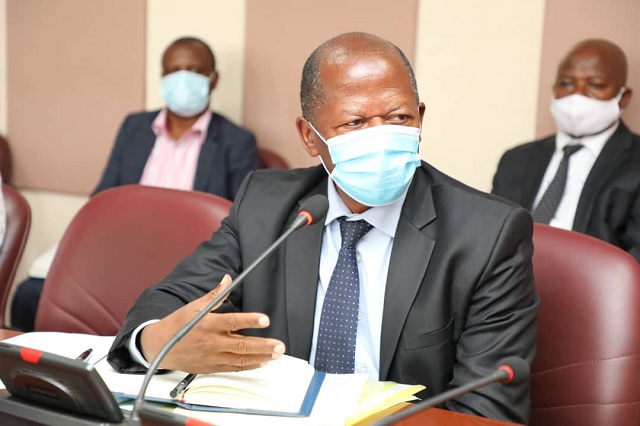
Kampala, Uganda | THE INDEPENDENT | For the 18 months of the nationwide school closure, private school teachers have been waiting to get a relief fund from the government. However, the long-awaited revolving fund worth Shillings 20 billion might not come through soon as different groups fight for its management.
Ismael Mulindwa, the chairperson of the COVID-19 Education Response Task Force, says that by last week, they had finalized arrangements for releasing the funds through the Microfinance Support Centre. He, however, says that the arrangements suffered a setback as several teachers’ unions and associations challenged the move.
Some of the associations fighting to be at the helm of the process are Uganda Private Teacher’s Union, National Private School Teachers’ Association and Coalition of Private School Teachers’ Associations.
Juma Mwamula, the General Secretary of Uganda Private Teacher’s Union notes that these associations were already in existence and have a sizable number of subscribers, private teachers, who are likely to be left out in the current arrangement.
“There is a section of people who had duped the minister that there is only one association representing the interests of private teachers. They are aimed at ring-fencing the funds to a section of teachers leaving out many others who had formed associations and unions way back before this fund,” Mwamula said.
Adding that “there should be a mechanism where all teachers in the respective groupings can access the funds rather than forcing them to be part of an association. if the ministry is looking at one group, this cannot go unchallenged.”
When the relief package was announced by the president, the government wanted the money to be channeled through the Microfinance Support Centre- MSC but the ministry of education refused the idea basing on the past experience with the public-school teachers’ funds.
By removing MSC from the picture, the ministry wanted the money to go directly to the teachers’ association. Mulindwa says that at that time several groups uniting sections of private school teachers wanted to be in charge of the process but none was found to be representative enough.
“To have a representative structure, the ministry decided to reorganize teachers into structures right from the school to national level,” Mulindwa adds. The said organization process alone took over six months later forming the National Private School Teachers’ Association-NPSTA.
Mulindwa noted that on Thursday last week, the ministry invited interested groups to find a common ground given the fact that they are all after the welfare of the same people. However, after hours of interaction, leaders of the different groups failed to agree on anything.
Mulindwa says the ministry is now contemplating a way forward to ensure that the funds reach the targeted beneficiaries. As the different groups fight, many private school teachers interviewed have already lost hope of accessing the funds.
Godlive Baguma, who has been forced to move to Masaka from Kampala where he was teaching before the COVID-19 induced school closure, says it would have been better if teachers had got this money a month or two after the president’s pronouncement.
“There is a lot of politics surrounding that fund. Many teachers have lost interest in that money. We have moved on and trying other means to survive,” says Baguma.
John Chrysostom Muyingo, the Minister in charge of Higher Education, says that it is shameful to learn that some teachers who are known as an organized group of people resorted to chicken fights and personal interests yet many of their colleagues are in dire need of relief package.
Muyingo notes that there is a need to mediate between the different groups since the current standoff is affecting teachers at the grass-root whose goal is to access the funds.
Peter Paul Etiang, Chairperson of National Private School Teachers’ Association notes that although their group had signed a memorandum of understanding with the education minister giving them rights to manage the funds, they are open to compromise so as to bring other associations and unions on board.
Etiang says the National Private School Teachers’ Association had already drafted operational guidelines stipulating how the money could be shared and it’s within this arrangement that they can fit the different associations and unions.
According to Etiang, National Private School Teachers’ Association proposes that each private schools’ teacher SACCOS in a given district/city and 5 divisions of Kampala receives Shillings 100 million and Municipality SACCO receives Shillings 50 million seed capital. It is unclear how many SACCOS would benefit from the funds if this is affected.
Last year, before the education ministry intervened in the process, the Microfinance Support Centre had advised teachers to create and register SACCOS of not more than 30 people. In the proposed arrangement, each SACCO would qualify to get a maximum of Shillings 30 million.
At that time John Peter Mujuni, the MSC executive director, told URN that in the first round most of the SACCOS were expected to apply for Shillings 10 million with the available fund benefiting 2000 SACCOS across the country reaching out to 60,000 teachers.
The post Release of private teacher’s relief fund hits another snag appeared first on The Independent Uganda:.
from The Independent Uganda: https://ift.tt/3acz7Dm
0 Comments